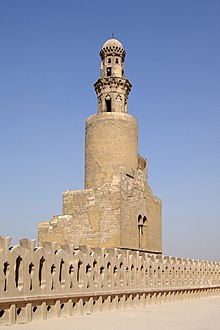Tulunids
The Tulunids ( Arabic طولونيون, DMG Ṭūlūniyūn ) were the first independent dynasty in early Islamic Egypt , they ruled the country 868–905.
When the Abbasids lost control of the outskirts of the empire in the 9th century due to internal disputes, the former Turkish slave Ahmad ibn Tulun (868-884) swung himself up to governor in Egypt in 868 . He proclaimed independence from the caliphate . Since the tax revenue was no longer paid to the caliphs, the expansion of the irrigation systems and the construction of a fleet was possible, through which economy and trade were strongly promoted. In 878, Palestine and Syria were also occupied to better protect Egypt against attacks by the Abbasids.
Under Chumarawaih (884–895) there was lively construction activity. A remarkable testimony was left, for example, with the al-Kata'i mosque (built in 876–879) in a newly established district in Cairo . In doing so, the objectives of the Mesopotamian models were emulated . An expensive, ostentatious, courtly holding ruined the state finances , and after the murder of the head, harem intrigues led to the rapid decline of the dynasty. In 905 Egypt was subdued again by the Abbasid troops. However, the Abbasids lost Egypt again to the Ichschidids in 935 .
Ruler
- Ahmad ibn Tulun (868-884)
- Chumarawaih (884-896)
- Abu al-Asakir (896)
- Harun (896-904)
- Schaiban (904-905)
Individual evidence
- ↑ Umberto Scerrato, Islam - Monuments of Great Cultures, p. 37 (see LIT directory)
literature
- Ulrich Haarmann : History of the Arab World. Edited by Heinz Halm . 4th revised and expanded edition. CH Beck, Munich 2001, ISBN 3-406-47486-1 ( Beck's historical library ).
- Umberto Scerrato: Islam - Monuments of Great Cultures . 1972 (license issue, order number: 012 724).

